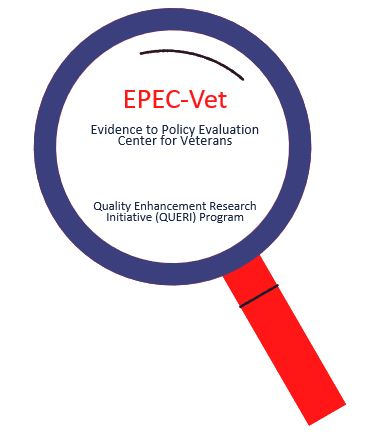QUERI Centers and CORE
CINCCH investigators have extensive experience in implementation research and dissemination that has impacted policy and practice. CINCCH's capacity for implementation research and dissemination is enhanced through 2 QUERI programs and 1 Consortia of Research led or co-led by CINCCH investigators:
Evidence to Policy Evaluation Center for Veterans (EPEC-Vet)
 Drs. Frances Weaver and Kevin Stroupe are principal investigators for CINCCH's QUERI Evidence to Policy Evaluation Center for Veterans (EPEC-Vet). This project is one of CINCCH's largest efforts, spanning 5 years and 4.1 million dollars with core leaders, co-investigators, and seasoned study team members from Edward Hines Jr VAMC in Hines, Illinois, Jesse Brown VAMC in Chicago, Illinois, William S. Middleton Memorial VAMC in Madison, Wisconsin, and James A. Haley VAMC in Tampa, Florida.
Drs. Frances Weaver and Kevin Stroupe are principal investigators for CINCCH's QUERI Evidence to Policy Evaluation Center for Veterans (EPEC-Vet). This project is one of CINCCH's largest efforts, spanning 5 years and 4.1 million dollars with core leaders, co-investigators, and seasoned study team members from Edward Hines Jr VAMC in Hines, Illinois, Jesse Brown VAMC in Chicago, Illinois, William S. Middleton Memorial VAMC in Madison, Wisconsin, and James A. Haley VAMC in Tampa, Florida.
The overall goal of EPEC-Vet is to improve Veteran care and outcomes by conducting rigorous evaluations that will provide evidence needed to support or modify VHA policies and practices to provide the best outcomes for Veterans. EPEC-Vet will accomplish this goal by building an infrastructure that supports generation and dissemination of evidence from rigorous and timely evaluations of high priority programs and policies that affect Veteran care and outcomes. These evaluations will address effectiveness, efficiency and sustainability in accordance with the Evidence Act of 2018 (US Public Law 115-435).
EPEC-VET objectives:
1. Establish and sustain a robust methods core that supports the planning and conduct of at least two evaluations per year, including expertise in research methods, database and pragmatic trial study design and construction, program evaluation and implementation, to form the foundation for addressing questions on multilevel impacts of programs or policies.
2. To conduct rigorous evaluations that incorporate innovative methods, data collection and/or analytic strategies, including a set of common evaluation criteria (e.g., economic impact; variation and unintended consequences) across evaluations, and track common themes and lessons learned.
3. Employ state-of-the-art knowledge translation methods to effectively disseminate evaluation results to key VA stakeholders and broader policy and scientific communities, and to facilitate the translation of new evidence into policies, programs, and practice.
The first two EPEC-Vet evaluations include 1) the impact of military toxin legislation on Veterans' use of care, submission of claims, and Veteran experience; and 2) impacts of vocational service use on VA healthcare utilization and costs.
Combating Antimicrobial Resistance through Rapid Implementation of Available Guidelines and Evidence II (CARRIAGE II)

The QUERI program 'Combating Antimicrobial Resistance through Rapid Implementation of Available Guidelines and Evidence II' (CARRIAGE II) is co-led by Dr. Charlesnika Evans, and focuses on improving appropriate use of antibiotics and preventing the spread of antimicrobial resistant organisms. Dr. Evans is leading a CARRIAGE II implementation project to increase use of an alert system to identify patients admitted with a history of antimicrobial resistant organisms to decrease spread of infections, which is using implementation science methods to increase use of this alert system.
Nursing Data and Research Consortium (NDRC)
The Nursing Data and Research Consortium (NDRC) is co-led by CINCCH's Dr. Lisa Burkhart, along with Drs. Lynn Baniak (Center for Health Equity Research and Promotion) and Laura Petersen (Center for Innovations in Quality, Effectiveness and Safety), with support from the Office of Nursing Services (ONS). In response to the 2023 VHA Nursing State of the Art (SOTA) and 2024 Nursing Research Agenda, the NDRC will work to advance the five priorities:
- Understanding nurse staffing needs
- Improving the nursing work environment
- Optimizing nursing practice around pressure injury
- Optimizing nursing practice around the social determinants of health
- Optimizing nursing practice around care coordination
Specifically, the NDRC will:
- Develop nursing data infrastructure.
- Synthesize current evidence to identify research and data gaps for the five Nursing Research Agenda priority areas.
- Establish and activate collaborative and inclusive networks of Veterans, leaders, researchers, and practicing nurses to ground the identified gaps in experience and identify interdisciplinary teams to address identified gaps.
Visit the NDRC webpage here.



















